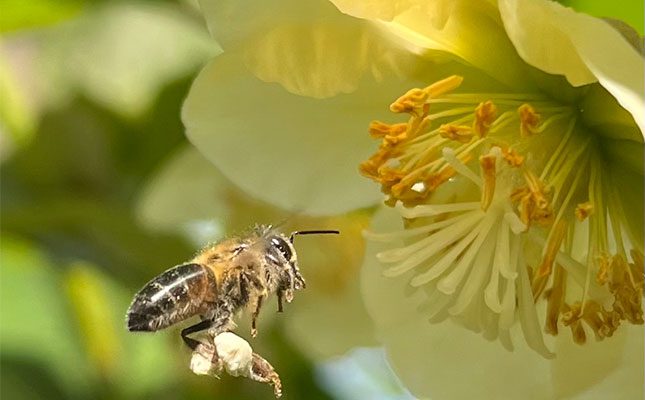
Pollination innovation: a local company’s solutions to decline in bees
As the world grapples with an alarming decline in bee populations due to environmental changes and pesticide use, the agriculture sector faces a critical challenge: ensuring the adequate pollination of crops.
In the coastal city of Gqeberha in the Eastern Cape, the Bee-Tech Group is pioneering solutions to this issue, revolutionising traditional beekeeping practices and transforming them into advanced pollination science.
Led by Michiel Bruggeman, Bee-Tech is making significant strides in optimising pollination processes to benefit farmers while protecting and enhancing bee populations.
A chance beginning
Bruggeman’s journey into beekeeping and the eventual creation of Bee-Tech was not something he had planned. Originally from Belgium, he came to South Africa more than 20 years ago.
After marrying a woman from Gqeberha, they moved to the UK where they lived for several years before returning to South Africa in 2012. Finding work here proved difficult, which led him to an unexpected opportunity that would change the course of his career.
“I thought: ‘How hard can it be to find a job?’ Turns out, it’s quite hard. A beekeeper came to my in-laws’ home to do a bee removal. I went along, saw how he did it, and asked if I could learn by working alongside his staff,” says Bruggeman.
This curiosity led him to acquire his first beehive later that year, marking the start of his new life as a beekeeper.
However, he quickly realised that traditional beekeeping, particularly honey production, was not where his interest truly lay.
“For me, the opportunity in beekeeping doesn’t lie in making and chasing honey, but rather in pollination,” he explains.
This insight set him on a path that would eventually lead to the founding of Bee-Tech Group, a company dedicated to improving pollination practices to help farmers achieve better yields and contribute to environmental sustainability.
From honey to pollination
Honey production in South Africa is fraught with challenges. The country’s unpredictable weather, including severe droughts and strong winds, makes honey production very challenging. This instability and his passion to learn more led Bruggeman to shift his focus entirely to pollination services.
“Honey is very weather dependent. We’ve had huge droughts, wind and even vandalism, making it difficult to produce honey consistently,” explains Bruggeman.
Realising that honey alone could not sustain his business or family, he decided to concentrate on the more stable and impactful area of pollination.
Pollination is a critical component of agriculture, yet it often does not receive the attention it deserves. Most crops have a very narrow window in which they must be pollinated to ensure a successful fruit set.
“You have two weeks on most crops, three weeks on some; strawberries and blueberries obviously have much longer, but on most crops, you have very little time to actually get a fruit set. So, you have to pollinate, right?” he says.
Despite its importance, Bruggeman noticed a significant gap in the scientific understanding and data-driven approaches to pollination in South Africa.
“In South Africa, a lot of pollination is still done by beekeepers putting bees in the field and hoping for the best. There’s not much data and not much science built around it,” he says.
Determined to change this, he began to explore how science and data could be used to improve pollination practices.
A scientific approach
To bring a more scientific approach to pollination, Bruggeman started assembling a team of experts, including Jamie Harris, who would become the head of research at Bee-Tech.
“I’ve been fortunate to build a team of people with me, scientists who are furiously curious and want to learn more,” says Bruggeman.
This team has been instrumental in developing best practices and gathering the data necessary to optimise pollination processes.
One of the pivotal moments for Bee-Tech came five years ago when seed company Sakata approached Bruggeman with a pressing question: what is the biggest threat to beekeeping in South Africa?
Bruggeman’s answer was clear: multiplying swarms through queen breeding.
“Beekeepers put empty boxes out and hope, pray and wish that bees would move in. But in bad years there’s a shortage of swarms,” he explains.
To address this issue, Bee-Tech developed a system for breeding bees on a large scale, ensuring a more consistent and reliable supply of bees for pollination.
A revolutionary dispenser
Among the many innovations developed by Bee-Tech, one stands out as particularly groundbreaking: a dispenser that uses bees to apply a biological control agent directly to crops. This technology has the potential to revolutionise how farmers protect their crops from pests and diseases.
“The bees go out one way, come in another way, and while they go out, they actually get coated in beneficial substances like Trichoderma, Clonostachys and Metarhizium,” Bruggeman explains.
These fungi help protect plants from pests and diseases, and the bees deliver them with incredible precision.
“The bees deliver [the substance] directly – with 99% accuracy – to flowers, where you want them to be,” he adds.
This innovation has been tested on strawberry farms in the George area, with promising results.
“We successfully ran prototypes on three strawberry farms last year. Once we have the mass production version, we’re looking at rolling it out by September or October,” he says.
The dispenser is set to be used on a variety of crops, including pomegranates, bananas, macadamias, as well as in seed production.
Expanding the impact
Bee-Tech’s work extends beyond just pollination. Recognising the critical role that pollen viability plays in crop success, the company recently acquired a pollen analyser from Switzerland. This state-of-the-art equipment will allow the team to gather crucial data on pollen quality, which directly influences fruit set.
“A wide variety of trees and crops are planted in different areas, but we actually don’t know how the heat, cold, wind and humidity affect the quality of the pollen. The quality of the pollen directly influences the fruit set,” Bruggeman explains.
The analyser will be used in various research projects, ranging from avocados, onions, almonds and cherries, to better understand how environmental factors impact pollen viability.
For Bruggeman, the motivation behind Bee-Tech’s work is deeply rooted in a commitment to sustainability.
“I want to add value for farmers because I really believe that if we do that, we directly save the environment. If you can get 50t of kiwifruit off 1ha instead of 2ha, you can save water, save resources and leave more land available for indigenous plants and other pollinators,” he says.
This commitment to sustainability is reflected in everything Bee-Tech does, from their data-driven approach to pollination to their innovative dispenser technology. By helping farmers maximise their yields and minimise their environmental impact, Bee-Tech is playing a crucial role in creating a more sustainable future for agriculture.
The road ahead
Despite the challenges, Bruggeman remains optimistic about the future of Bee-Tech and the impact it can have on the agriculture sector.
“Some of this is hard work and a bit of luck. You click with people, realise you have something in common and journey with them,” he reflects.
Looking ahead, Bee-Tech is poised to continue its expansion. The company is setting up national distribution for its dispenser and is actively working on research projects across South Africa.
“The big crop opportunities definitely lie in other parts of the country — the Western Cape, up north for avocados and even niche crops like granadillas,” Bruggeman says.
He further says that “pollination is critical at the centre of farming. If you miss the opportunity to pollinate, your year is gone.”
By investing in advanced pollination techniques, farmers can maximise their yields and ensure the sustainability of their operations.
As Bee-Tech continues to innovate and expand, the impact of their work on the agriculture sector in South Africa – and potentially the world – cannot be overstated. With Bruggeman at the helm, supported by a passionate and skilled team, the future of pollination looks brighter than ever.
“We’re building data and knowledge, and we’re very keen to work with people. We know very little, but we’re learning. And we’re definitely interested in helping industries and individual growers improve their return on crops,” he says.
Email Michiel Bruggeman at michiel@bee-techgroup.com.
Source: Farmersweekly.co.za
